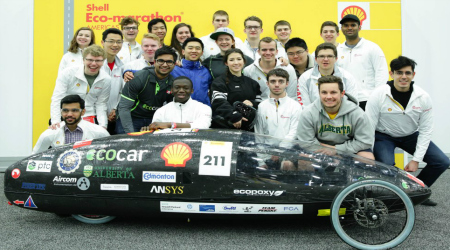
UAlberta EcoCar Team and their prototype vehicle, Sofie.
(Edmonton) Imagine traveling from Calgary to Vancouver and back on a single gallon of gas. That's the kind of energy efficiency the University of Alberta Eco Car team managed to get out of one of its hydrogen fuel cell vehicles at an international competition.
And this year the students are hoping to do better, after making improvements to Sofie and Alice-their two hydrogen fuel cell vehicles.
The team unveiled its vehicles recently and is preparing to send the cars and about 20 team members to compete in the Shell Eco-Marathon Americas in Sonoma, California, April 19 - 22.
The winner of this competition isn't the fastest car-it's the one that's most efficient. Drivers test their car's ability to travel a certain distance (about 10 km) in a set time. The team using the least amount of energy wins.
Sofie is the more compact of the two siblings and placed second in her category when she made her debut in the 2017 Shell Eco-Marathon. After a year of redesigns, the team is hoping to improve on her previous efficiency score, giving her the energy equivalent of more than 1,300 miles per gallon.
The team hopes Alice will take home a prize in the UrbanConcept category, which she won in 2016. These slightly larger vehicles are not only designed to be efficient, but also with aesthetics and some of our more common comforts in mind, like interior seat designs, windshield wipers, lights, and luggage space. Winners from this category have the opportunity to compete in the Driver's World Championship in London, England, in July. Alice qualified for the 2016 Driver's World Championship, and the team is ready to get her back in the race.
Students in the EcoCar club enhance their academic knowledge and skills while pushing the limits of innovation. Competing in the races also gives them learning experiences they wouldn't get in the classroom.
For example, Natasha Pye, the EcoCar project manager, recalls that during a rainy race day at a previous Shell Eco-Marathon, the team discovered one of their vehicle's gears absorbed water-this unforeseen phenomenon set the team back because the swollen, water-soaked gear interfered with the car's performance.
Pye says it was a real-world learning experience.
"We wouldn't have known the gear would swell if we weren't competing in the rain."
The team works together to troubleshoot issues on the fly and use experiences like the "swollen gear" to improve future designs.
You can follow the EcoCar Team in Sonoma by checking out their blog.